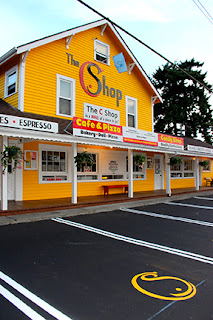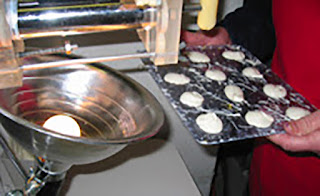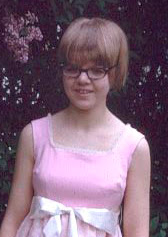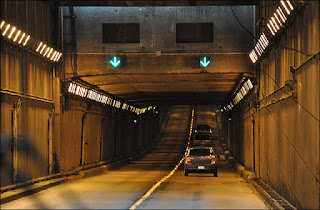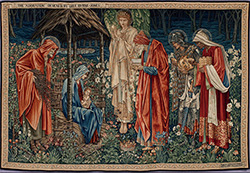“How about one last toboggan ride, Brenda, before we call it a day?”
Winter 1963, we lived at Laurentian Lodge, an Intervarsity Christian Fellowship ski resort seventy miles north of Montreal. College kids came up on the weekends. Mum cooked. Dad ran the ski hill and other things. I was ten years old, and in the mountains of French Canada night came on quickly. To go for one last ride with my father before tromping down to the lodge was all a little girl like me could ask for.
Yes, yes! I hopped up and down on toes gone cold. He looped the toboggan rope around the towline in an easy slipknot, and I scrambled aboard the aluminum sleigh, grasped him around the middle, and waited for the jerk. There it was, we were moving, and I pressed my cheek against Dad’s cold woolen jacket.
It wasn’t a smooth ride up. The toboggan lurched, slacked, then jerked into motion. I fell into the rhythm of Dad’s arms stretching and pulling in, and I heard his occasional grunt more by the vibrations coming through his jacket than with my ears. The forest fell away to the right as we ascended, the evergreens dark and snowy white in the gathering gray, the larch and elm skeletal. I breathed and shivered and hung on tight, and I smiled in the sheer pleasure at the sensation of the snow beneath me.
“John!” Dad hollered, lifting an arm to wave at Mr. Hardy skiing downhill past us. “This’ll have to be your last run.” Mr. Hardy nodded and whizzed on by. The toboggan gave a lunge, throwing me back. “Daddy!” I shrieked.
He threw back an arm to snag me but missed, and the snow gave a snatch and flung me into its lap, belly down. I pulled a mitten off to dab at the snow in my eyes, then quickly stuffed my frozen hand back into its icy cocoon. It was
really cold out. I clambered to my feet and peered uphill, stomping a bit to try and dull the burn in my toes.
Gray shadows crept over the hillside, the forest-green trees bruising into black, the other trees disappearing. Lamplight from the towrope posts glared down; at the bottom of the hill, where the machine shed stood, the last few colors of the day remained. All around, however, the sky closed in. I could
feel the air shift into deep freeze.
Seven to ten poles lined the trail, each with a pulley three-quarters of the way up, with the towline feeding from one to the other. I watched the rope loop, pulley to pulley, on its way back down the mountainside to the shed where, inside, an immense machine kept the hefty cable circling, sending it back up to me. It circled past at my waist, and I cupped my hand around it to feel the heft slip through my palm. I could still get to the top, I realized, and flung myself belly first over the rope and grabbed on, expecting a wobble and slow crawl. But the frozen snow on my mitts let the rope slide on. I chewed at the ice clumps, spit them out, fur in my mouth. I tried again. This time I caught and, rope slithering beneath me, started sliding up to where Dad would be waiting.
“Get out of the way!”
I looked up. Dad was plunging downhill straight at me! I rolled, spinning sideways. I hurried to my feet, but the snow was soft and I floundered. Dad tore past, toque flying.
What in the world?
I looked uphill and gaped, even as I heard the crunch and ping of the metal toboggan high up. There it was, shiny in the lamplight. It hadn’t come loose but was riding back downhill, riding over each of the pulleys, its cheap metal twisting and buckling, dislodging the rope, and I crawled in disbelief from the deep snow onto the beaten path just as the contorted toboggan hit the post nearest me, metal screaming as it slammed into the pulley. The rope bounced out and with a whoosh through the air, landed at my feet with a thud. Overhead, the toboggan continued its steady course, the tin of it pinging and screeching, more rope crashing through the air and dropping.
What if it went through the window into the machine shed?
At the bottom, Mr. Hardy frantically clawed at his feet, trying to kick aside his skis so he could get in and flip the switch. I snatched up my father’s toque and ran after him. “You lost your toque!” I hollered, slipping, standing, sliding again, stunned by the speed at which everything was happening. A quiet, slow world thrown into chaos.
One more pole to go before the toboggan rammed through the open window of the shed—
then what?
I watched in disbelief as Dad, going too fast to stop, smacked right into the building, bounced, caught himself, then right-angled into the door. He stumbled over Mr. Hardy, disappeared. And then…suddenly…quiet.
I descended down into the stillness, darkness pressing in and stars coming out. Outside the shed, the twisted toboggan hung in the air, glistening in the eerie light, so mangled it was beyond recognition. A fantastical piece of tinfoil.
“Daddy?” I stepped into the shed. His back was to me on the other side of the ginormous engine with its fan belts and knobs, his elbows resting on the open window that fed the rope in and back out. He turned and I saw weariness play across his eyes. He smiled, though. Blue eyes, marble blue in the cold light.
"Why don’t you go down to the kitchen?” he suggested. “Help Mum with supper. We’re going to be here a bit.”
I offered his toque. “What happened?”
“The knot froze.” He chuckled softly. “Looks like we're going to have to fix this mess.” He laughed again with an off-hand phooey and took his hat and patted it down around his ears.
“Do you have to do it now? It's so cold."
“It might snow tonight. Or ice over. Best do it now. By morning, it might be too late.” He tucked his head back through the window and leaned, twisting his neck to better see the toboggan. “So much for my slipknot,” he told Mr. Hardy with another chuckle. To me, he said, “It’s getting too cold. You better go on.”
I pulled a hand out and sucked on my stinging fingers. The warmth made it worse. I shoved my hand back into the mitt. I walked to the door and looked down to the lodge where I knew my mother and sisters were setting the tables. On Friday nights Mum made the visiting college kids a dinner of roast beef and potatoes, with peaches for dessert. My sisters and I had to make sure the peaches were dished out with their round sides up. “They’re more likely to eat them,” Mum told us.
“Do I have to?” I asked Dad.
“No.”
He and Mr. Hardy took the ladder from a corner. I scrunched up against the doorjamb to let them pass, then followed after them, shivering, chin bouncing.
How can he stand it? I wondered, watching my father set the extended ladder against the first post, give it a shake, then start to mount. He had to disengage the mashed toboggan before attempting anything else.
He and Mr. Hardy set to work and I huddled near the shed, hiding from the wind. Constantly I banged my feet against each other; sometimes I turned and kicked them into the building. The bright overhead light looked yellow and warm and I slid down the wall to sit in the pool of butter. The cold seeped into my bum like tiny ice picks. What was left of the toboggan finally fell with a puff. Its distorted shape scared me and I stood up, and stepped away.
Dad climbed down the ladder. He and Mr. Hardy moved to the second pole, looking strangely naked without its rope. Mr. Hardy helped Dad heave the towline onto his shoulder and up he went, ladder rattling. Balanced on a high rung and leaning against the post, he struggled with bare hands to lift the rope back into the pulley. Gusts of white fog escaped his lips as he labored, and I saw him wince as the frozen rope dug into his shaking hands.
 |
| Tresa On Saucer, Me On Top |
How can he endure it? I wondered again, and looked longingly down to the lodge where its small windows cast wee squares of light into a world gone black. Oh to be home, I thought. To shed my coat and boots, my mittens and toque, to stand over the furnace grate, four feet by four feet, and listen to the icicles melt off me and sizzle into the fire below. Oh that I was there.
My stomach hurt from shivering, I banged my toes into the ground, and banged again. Incessantly. I forced myself to look away from the warmth of home and focused instead on Dad’s face. I could see it clearly in the lamplight that shone from each post, a face haloed by night. I winced with each grimace he made.
Determined to stay, I hopped foot to foot and up and down while Dad and Mr. Hardy took turns. Once Dad caught my eye and smiled. I tried to smile back. My cheeks wouldn’t move. I tried again, and shivered some more. Slowly up the mountain we pushed, the night stealing in darker and colder. Up to the next pole. Up to the next. I wanted to cry, I was that cold. Yet on and on they worked, Dad and Mr. Hardy. And me.
As night set in for real, ice began to sheet the ground. They sent me back to the shed for a hatchet. I was glad of the task. When I gave it to Mr. Hardy, he said, “This is no job for a girl!”
“Don’t chop the rope,” I told him.
“That’s your job,” he said. “To make sure I don’t.”
We were almost there! Two more poles to go!
But Dad and Mr. Hardy headed straight for the final post. Dad groaned as he fought to stretch what was left of the rope into place. I feared he'd lose grip and fling himself backward, off the ladder. Or teeter sideways. He didn't.
But they weren't done. Not yet. There was that one last post, one down from us. We backtracked. The rope had little play. Brute strength would be needed to wrangle it up and over the pulley. By now, I was without pain. No stinging burn in my fingers or feet, no shivers. I lifted my arms woodenly, bent over at the waist, knocked them against my legs. I checked to see if my feet were still there. They were, which almost surprised me.
“Finished,” my father called down.
Mr. Hardy tossed his hat up. I watched it spiral lazily down. Watched him catch it and put it back on.
I tried to help carry the ladder back down but couldn’t keep the pace. Instead I slipped along behind them, the newly formed ice catching my boots against the holes they'd gouged with each step. At the shed, Dad and Mr. Hardy put the ladder back in its corner.
“Want a ride down to the lodge?” Dad asked, snagging another toboggan and flipping off the lights. I must have nodded.
Outside the night was velvet—and filled with moonlight and stars. Dad dropped the sled onto the snow. I was so numb I couldn’t bend. “I can’t sit down, Daddy.”
He and Mr. Hardy helped me.

“Ready?”
"Yes."
Dad took the line in hand and I waited for the jerk and momentum, then settled in, happy with the sensation of riding over the undulating snow, slipping this way and that on the hilly descent, watching the window light of the lodge expand as we approached, listening to Dad and Mr. Hardy talk in the wind. A snowflake. Another. And another. I stuck out my tongue to catch them.
Down the hill we slithered. The wind picked up. The flakes thickened, fluffing up in front of us. The windows grew large enough to see the tables indoors, surrounded by cheerful skiers nursing mugs of hot cocoa, their peaches gone, the bowls empty.
A whisper in my ear. I felt Daddy lift me.
“She’s frozen through,” I heard him tell Mr. Hardy.
I hardly remember sitting on the four-by-four-foot grate, heat leaping up at me. I hardly remember anything that followed. Nothing, actually. Only that I had stuck it out. I had not abandoned my father. A sense of euphoria overwhelmed me.
Many years have passed since that cold, snowy night in the Laurentian Mountains of French Canada. Yet I often go back, the memory as crisp and clear as the night. A little girl in love with her father, and so full of wonder at how he could laugh at any upset—and always make it right.
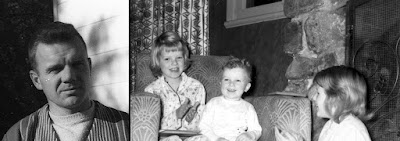 |
| Roy Wilbee | Brenda, Tim, Linda Wilbee 1963 |





